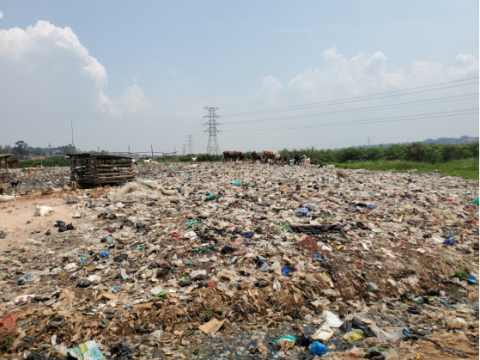Transforming waste into a livelihood source for climate change resilience. By Hope Mutesi.

Different human activities create waste, but it is the way in which this waste is managed disposed off that still poses a risk to the environment and worsens already existing climate change impacts like flooding. According to KCCA, the city is estimated to generate approximately 2,500 tonnes of garbage daily, yet only about 1,200 tonnes are collected by garbage trucks. The uncollected waste often ends up in inappropriate locations, such as drainage channels, exacerbating the city’s sanitation issues.
In slum communities like Kirombe, where poor waste management remains an environmental and public health concern whilst opportunities to young people are scarce, a young green city champion named Adyejonal Joynar is redefining possibilities around the community. With passion for creating positive change in her community, she has embraced agripreneurship and waste recycling as her and her family's livelihood source, transforming what many see as waste into valuable resources.
Joynar’s journey started with the inspiration and skills she obtained in a climate resilient urban farming training that was organized by Footmarks Initiative Uganda under the GhettoGoGreen project. This training equipped 175 young people both male and female in Kirombe community with climate-smart urban farming and recycling skills. "Through hands-on training from an agronomist and peer to peer engagement, i gained the knowledge and confidence to turn my available resources like discarded plastics and other waste materials into marketable products for an income," said Joynar, green city champion.
Together with a group of like-minded young people, Joynar transform waste in the community that is discarded at a waste fill in Kirombe, where they collect, sort, recycle waste and also sell it. Their efforts are not just about cleaning up the environment through community clean ups but also creating economic opportunities for themselves as well as fellow young people. The recycled waste, especially plastics, are sold to urban farmers who repurpose and reuse them for farming activities. This innovative approach has provided a sustainable livelihood for Joynar and her peers while contributing to sustainable waste management practices in Kirombe.
Additionally, Joynar is engaged in urban farming where she grows vegetables like sukuma and spinach. She is using the knowledge and skills acquired to motivate other youth into different climate action income generating initiatives. The impact of Joynar’s initiative goes beyond financial gains. It is a powerful statement that young people can contribute immensely to climate action in their communities. Through her initiative, she continues to inspire many young people like her in Kirombe to see waste not as a burden but as an opportunity for innovation and income source.
